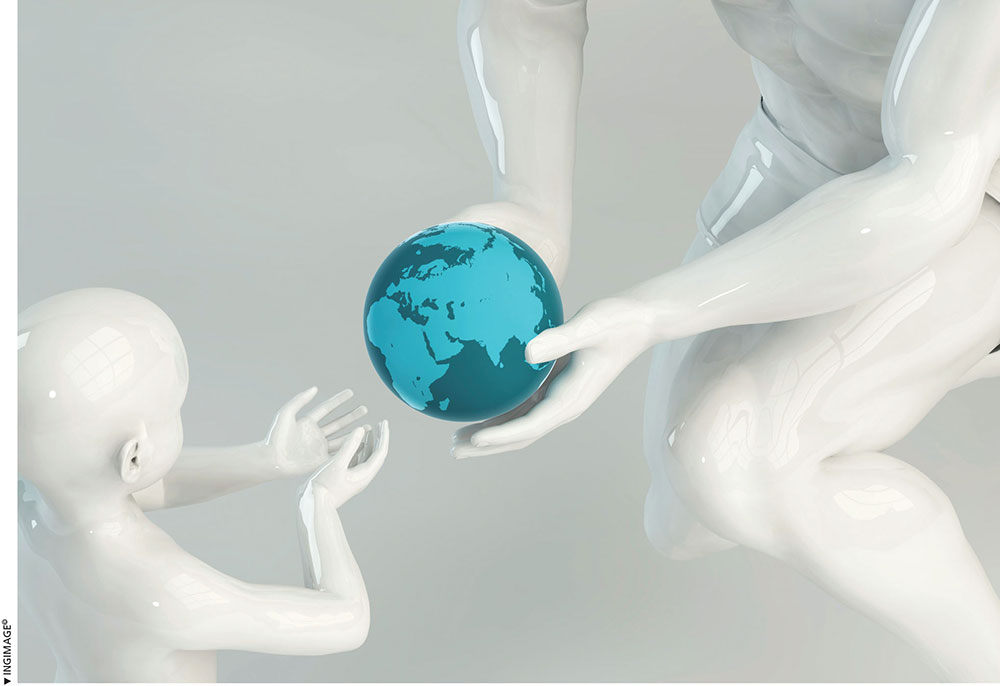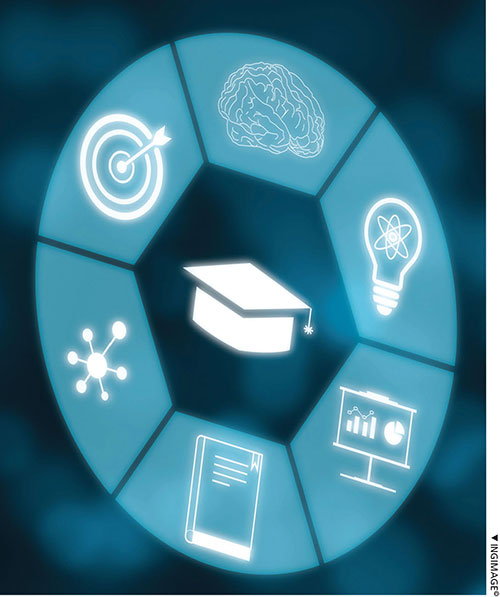Prof. Lakshman Samaranayake
The transfer and dissemination of knowledge

A renowned academic and microbiologist, and senior university administrator, Prof. Lakshman Samaranayake spent time as a consultant microbiologist in the UK following completion of his education in Sri Lanka.
Presently a Professor Emeritus at the University of Hong Kong, he has also worked at universities in Canada, Australia, the UK, Kuwait, the UAE and Sri Lanka.
Among his notable achievements in academia, Samaranayake earned recognition for his time as the Dean of the University of Hong Kong’s Faculty of Dentistry, which he led to being ranked No. 1 in the QS World University Rankings.
He has also received a number of accolades such as the King James IV Professorship of the Royal College of Surgeons of Edinburgh and a Lifetime Achievement Award from Sri Lanka Foundation International.
In this exclusive interview, Samaranayake outlines the role of industry in supporting the education sector’s research efforts and sheds light on Sri Lanka’s potential in dental tourism.
Q: Your career trajectory spans multiple continents and prestigious institutions. What inspired you to pursue dentistry, and ultimately specialise in oral medicine and pathology?
A: Since childhood, I’ve been curious about bugs (bacteria/fungi) and how they cause disease – so much so that biology was my favourite subject in school at Royal College.
I wished to pursue a career investigating diseases and bugs; and naturally, I had two options for graduate studies – viz. biological or health sciences. I chose the latter professional path.
Enrolling in the dental school at the University of Peradeniya was an indirect route to pursuing this goal. At university, I was more attracted to biological rather than practical subjects, such as filling and drilling therapies.
What caught my fascination was microbiology and immunology in the second year of the dental course. My goal then was to take the untrodden pathway of specialising in this area of oral pathology and medicine – a first for a Sri Lankan.

Q: You’ve held honorary professorships at many international universities. How do these collaborations contribute to your research and teaching endeavours?
A: I have been blessed to be appointed to visiting, adjunct and honorary professorships in no less than seven international universities. Currently, I’m Professor Emeritus at Chulalongkorn University in Thailand.
These appointments have helped me connect and network with researchers and academics across the world.
Through such connectivity, I have facilitated either the employment or placement of no less than 20 Sri Lankan medical or dental professionals for their PhD and medical degree programmes in many countries.
And I’m pleased to say that most have returned home and are currently serving as professors or consultants in various universities, as well as the health department. To me, the act of helping compatriots is a fulfilling life goal and my aim is to continue to do so as I sincerely believe that this is an obligation I should fulfil for my motherland.
In terms of knowledge transfer and dissemination, I also work closely with the Office for Overseas Sri Lankan Affairs (OOSLA) to conduct workshops and seminars at several universities in Sri Lanka, sharing my knowledge on academic administration, novel pedagogic techniques and university or faculty rankings.
Q: Given your involvement in academia, what role do you believe industry partnerships should play in advancing research and education?
A: Having lived in Hong Kong for over three decades, I’ve witnessed how research and education have flourished through university-industry partnerships. As such, I believe thatindustry has a major unfulfilled role in advancing university research and education in Sri Lanka.
For instance, at the University of Hong Kong (HKU), virtually every building is named after a major industry benefactor. There are over 120 endowed professorships with a total endowment of almost US$ 250 million.
I’m conscious of the fact that these are two contrasting realms – one very rich and another not so – but the ethos of giving back to the universities is virtually nonexistent in Sri Lanka. This is unfortunate as universities cannot be sustained through the public purse alone, delivering free education to all and sundry.
Therefore, I am working with the University of Peradeniya Vice Chancellor Prof. M. D. Lamawansa to establish an inaugural endowed professorship scheme in Sri Lanka, the statute for which was recently ratified by its council.
This scheme entails a 50-50 partnership by an industry or a private donor and the university to set up an endowment. Then the annual interest garnered by the latter will be used in perpetuity by an eminent senior professor for research and scholarship.
The endowed professorship will be named after the donor, thereby providing an opportunity for industrialists to associate themselves with prestigious universities. These endowments have no strings attached, enabling the universities to maintain their independence and integrity.

Q: Dental tourism is a growing phenomenon with patients travelling overseas for cheaper treatment options. What are your thoughts on the potential benefits and risks associated with dental tourism?
A: Dentistry in Sri Lanka is substantially cheaper than in developed countries. For instance, a single tooth implant costs between seven and 10 times more in jurisdictions such as Hong Kong, the UK and the US.
Sri Lanka could do much more and publicise the quality dental care we can offer tourists at a fraction of the cost charged in jurisdictions such as Europe and the US. Dental tourism is big business in nations like Thailand and I believe we should certainly explore this additional source of revenue from tourism to bring more foreign currency into our country.
However, guardrails and provisions should be in place to curb unscrupulous unqualified individuals offering low quality services that may bring ill repute to the profession and country alike.
Q: What key differences have you observed in the dental education systems and practices between Sri Lanka and Hong Kong?
A: In Hong Kong, we have an open discovery educational system termed ‘problem-based learning’ (PBL) with real life scenarios and minimal lecture content. This system is inquiry based, self-directed, contextualised and contemporaneous.
On the other hand, the local curriculum at the University of Peradeniya is more a guided discovery system with significant lecture content that could be expunged while the University of Sri Jayewardenepura’s dental school has a traditional didactic curriculum, which I’m not in favour of.
It’s my belief that all teaching modules in medicine and dentistry in Sri Lanka should embrace at least a modicum of PBL – i.e. to prepare doctors and dentists with lifelong learning skills, and the ability to embrace new AI-based cutting-edge technologies.
Indeed, PBL technology should permeate all schools in Sri Lanka to produce a futuristic skilled workforce that’s second to none in the world.

Q: Sri Lanka has taken strides in oral healthcare but continues to face challenges – particularly in rural areas. What initiatives or strategies do you believe are crucial for improving access to dental care across the island?
A: The fact that dentists and doctors tend to congregate in major cities with easy access to schooling, transport services and healthcare is a global phenomenon. Sri Lanka is no different in this context, leading to underserved dental care in peripheries.
The obvious solution is increasing the government dental cadre and compulsory service of all healthcare workers in rural jurisdictions. If I recall correctly, the latter provision is extant in Sri Lanka to some extent.
Going forward, I believe that telemedicine and AI could step in and alleviate this issue to some extent with remote consultations, rehabilitation and aftercare supported by para-clinical personnel.
Furthermore, we could do more by employing qualified dental hygienists who can deliver basic dental care and educate the public in remote areas where dental surgeons may not prefer to be employed.
Perhaps this is a political issue with many ramifications!
FACT FILE
FAMILY
Father – Daniel
Mother – Daya
Wife – Yuthica Hemamala
Children – Dilani and Asanka
SCHOOLING
Royal College
HIGHER EDUCATION
University of Peradeniya
University of Glasgow
Specialisation in medical and oral microbiology – Glasgow Royal Infirmary
Fellowship of the Royal College of Pathologists (UK) – gained through examination
PRESENT OCCUPATION
Professor Emeritus at the University of Hong Kong
Honorary/adjunct/visiting professor at universities in Thailand (two), Indonesia, India (two), Sri Lanka (two) and Oman
COUNTRIES OF RESIDENCE
Hong Kong
Sri Lanka
CITIES OF RESIDENCE
Hong Kong
Kandy
SRI LANKA SWOT ANALYSIS
STRENGTHS
Central hub location in South Asia with abundant natural resources
Educated workforce
Untapped international diaspora of thousands of educated professionals (with the potential to contribute knowledge and resources to the motherland)
WEAKNESSES
Political interference and frequent system changes (two steps forwards and one backwards)
Corruption at all levels
Antiquated regulatory procedures and slow digitalisation
OPPORTUNITIES
Embracing AI
Inter and intra-institutional collaboration between all tertiary institutions in Sri Lanka (to synergise potential, eliminate the silo mentality and obviate duplication of all resources)
Brain gain (inviting the educated and affluent diaspora to contribute more to the country’s development, through knowledge and wealth sharing)
THREATS
Vast exodus of the educated (due to the deteriorating quality of the economy and living standards)
Lost opportunities due to competition from India and South Asia (in virtually all domains of industry and education)
Political uncertainties
